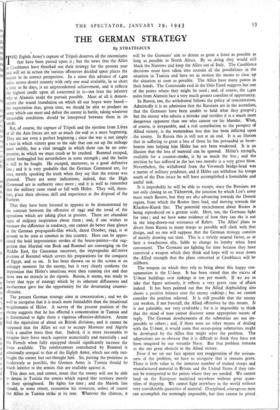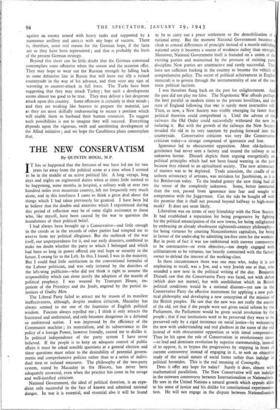THE GERMAN STRATEGY
By STRATEGICUS But, of course, the capture of Tripoli and the ejection from Libya of all the Axis forces are not so much the end as a mere beginning. They are not even a perfect beginning ; since the war is not simply a race in which victory goes to the side that can eat up the mileage most swiftly, but a vital struggle in which there can be no com- promise, in which we must crush or be crushed. Rommel escaped, rather bedraggled but nevertheless in some strength ; and the battle is still to be fought. He escaped, moreover, to a good defensive line ; and it is very probable that the German Command are, for once, merely speaking the truth when they say that the retreat was planned. There are some indications, indeed, that the High Command are in authority once more ; and it is well to remember that the military caste stand or fall with Hitler. They will, there- fore, pace their obvious skill and experience at the disposal of the Fuehrer.
That they have been listened to appears to be demonstrated by the contrast between the offensive of 1942 and the trend of the operations which are taking place at present. There are abundant signs of military inspiration about them ; and, if one wishes to measure the difference in tendency, one cannot do better than glance at the German propaganda-film which, dated October, 5942, is at present to be seen at cinemas in this country. Here can be appre- ciated the bold impressionist strokes of the house-painter—the sug- gestion that Marshal von Bock and Rommel are converging on the Middle East, the Caucasian successes, the impregnable defensive position of Rommel which covers his preparations for the conquest of Egypt, and so on. It has been thrown on to the screen at an unhappy moment for the enemy, but it very clearly confirms the impression that Hitler's intuitions were then running riot and that there was no miracle in the riposte. Russia, it seems, was ready to foster that type of strategy which by its inherent diffuseness and incoherence gave her the opportunity for the devastating counter- offensive.
The present German strategy aims at concentration ; and we do well to recognise that it is much more formidable than the intuitional megalomania of Hitler. A survey of the present position of • the enemy suggests that he has effected a concentration in Tunisia and is determined to fight there a vigorous offensive-defensive. Arnim had the equivalent of about six British divisions, and it cannot be supposed that the Allies set out to occupy Morocco and Algeria with a smaller force than that. Indeed, it is more reasonable to imagine their force much superior numerically and materially ; and the French when fully equipped should significantly increase the force available. The reinforcement contributed by Rommel is admittedly unequal to that of the Eighth Army, which not only out- fought the enemy but out-thought him. So, putting the positions as moderately as possible, the German Army in Tunisia should be much inferior to the armies that are available against it.
This does not, and cannot, mean that the enemy will not be able to detain in Tunisia the armies which regard that territory merely as their springboard. He fights for time ; and the Mareth line should, to some extent, economise his resources, unless of course the Allies in Tunisia strike at its rear. Whatever the chances, it will be the Germans' aim to detain as great a force as possible as long as possible in North Africa. By so doing they would still block the Narrows and keep the Allies out of Italy. The Casablanca decisions must have taken into account all the possibilities in the situation in Tunisia and have set in motion the means to clear up the situation as soon as possible. The Allies have many pawns in their hands. The Commando raid in the Oslo Fjord suggests but one of the points where they might be used ; and, of course, the moo miles from Alamein face a very much greater coastline of opportunity.
In Russia, too, the withdrawal follows the policy of concentration. Admittedly it is an admission that the Russians are in the ascendant, that the Germans have been unable to hold what they grasped ; but the enemy who admits a mistake and rectifies it is a much more dangerous opponent than one who cannot see his blunder. What,
of course, is irreparable, and a real contribution to the prospect of Allied victory, is the tremendous loss that has been inflicted upon . the enemy. In Russia this is still not at an end. It is an illusion that in suffering so great a loss of those he has persuaded or brow- beaten into helping him Hitler has not been weakened. It is an illusion that the loss of material can be ignored. Hitler's strength, available for a counter-stroke, is by so much the less ; and the attrition he has suffered in the last two months is a very grave blow. Nevertheless, the withdrawal from the Voronezh bridge-head was a matter of military prudence, and if Hitler can withdraw his troops south of the Don intact he will have accomplished a formidable and useful task.
It is improbable he will be able to escape, since the Russians are not only closing in on Tikhoretsk, the junction by which List's army must reach Rostov, but they are alssi advancing towards the Donetz region, from which the Rostov lines lead, and moving towards the Kharkov-Kursk line. The potential encirclement about Rostov is being reproduced on a greater scale. Here, too, the Germans fight for time ; and we have some evidence of how they can eke it out in the long-drawn-out resistance of Rzhev. The Allies' plans to divert from Russia as many troops as possible will clash with that design, and no one will suppose that the German strategy consists of merely drawing out time. This is a strictly neutral factor, or at best a treacherous ally, liable to change its loyalty when least convenient. The Germans are fighting for time because they have contrived a weapon which they think and hope will so wear down the. Allied strength that the plans concerted at Casablanca will be stillborn.
The weapon on which they rely to bring about this happy con- summation is the U-boat. It has been stated that the excess of U-boat buildings over sinkings is ten per month. If we are to take that figure seriously, it reflects a very grave state of affairs indeed. It has been pointed out that the Allied shipbuilding also shows a positive balance over the enemy sinkings ; but we cannot consider the position relieved. It is still possible that the enemy can weaken, if not forestall, the Allied offensives by this means. It is not palatable, nor very creditable ; for it is impossible to think that the mind of man cannot discover some appropriate means of reply. The German developments of the submarine are not im- possible to others ; and, if there were no other means of dealing with the U-boat, it would seem that ocean-going submarines might be developed by the Allies that might solve the problem. The adaptations are so obvious that it is difficult to think they have not been imagined by our versatile Navy. But that problem remains as the one great obstacle to the Allied victory.
Even if we set our face against any exaggeration of the serious- ness of the problem, we have to recognise that it remains grave. There is little value in the immense number of trained troops and manufactured material in Britain and the United States if they can- not be transported to the points where they are needed. We cannot land on the European mainland anywhere without great quan- tities of shipping. We cannot fight anywhere in the world without very considerable quantities of material. Disciplined, courageous men can accomplish the seemingly impossible, but they cannot be pitted
against an enemy armed with heavy tanks and supported by a numerous artillery and aircr.it with any hope of success. There is, therefore, some real reason for the German hope, if the facts are as they have been represented ; and that is probably the basis of the present German strategy.
Beyond this there can be little doubt that the German command contemplate some offensive when the season and the occasion offer. They may hope to wear out the Russian strength by falling back to some defensive line in Russia that will leave our ally a ruined countryside in the way of his advance, and then seize any sign of wavering to counter-attack in full force. The Turks have been suggesting that they may attack Turkey ; but such a development seems almost too good to be true. They may deliver a last desperate attack upon this country. Some offensive is certainly in their minds ; and they are working like beavers to prepare the material, just as they are most skilfully endeavouring to secure a position which will enable them to husband their human resources. To suggest such possibilities is not to imagine they will succeed. Everything depends upon the vigorous, swift and unrelenting development of the Allied initiative ; and we hope the Casablanca plans contemplate that.



























 Previous page
Previous page